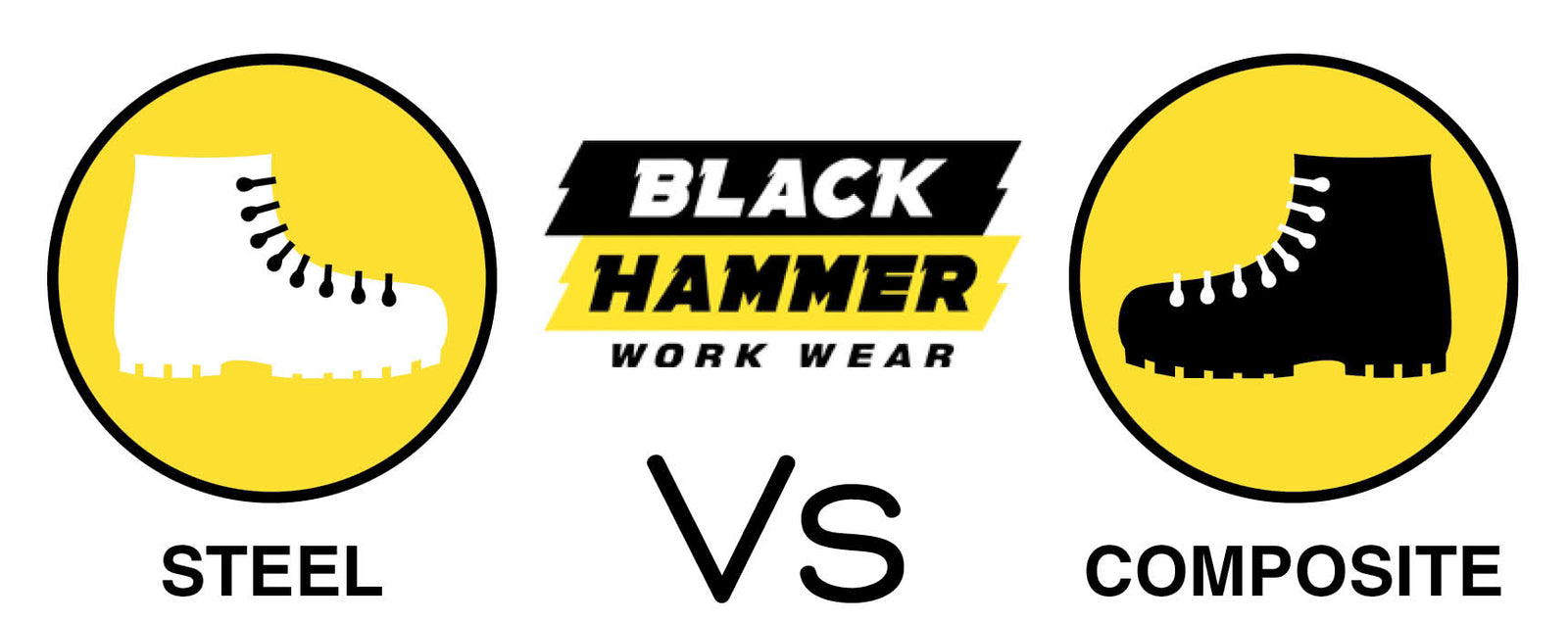Steel Toe Boots Mens have been the industry norm for many years. However, with advancements in technology, the new breed of Composite Safety Boots and work boots are becoming ever more some professionals’ go-to boot of choice. So which is the right boot for you? Here is our handy breakdown of the key points to help you decide.

There are different types of boots used for different purposes, with higher or lower safety requirements. However, the heaviest duty work boots must comply with EN ISO20345: 2004 with stipulates:
-
- 200 joules impact resistance (equivalent to a 20kg weight dropped 1020mm onto the toes)
-
- 15KN compression test (equivalent to 1.5 tonnes resting on the toe area)
1. BOTH steel and composite boots will have the same standards across the board and so for general workloads either are suitable. All of Black Hammer’s products, both composite and Steel Toe Cap Trainers Mens, come with reinforced insoles for greater penetration resistance against stray nails, rubble and glass or metal shards protruding from the ground. You can have full confidence that whichever toe cap you go for, you are not compromised on safety in any way.
2. STEEL work boots, however, will withstand somewhat greater impact and compression resistance than that standard which make them more suited for professions where there is a possibility of coming into contact with super heavy loads, or where pressurised and high powered cutting tools are in use such as nail guns, grinders and chainsaws.

Because steel is a conductor of heat, the temperature inside a boot with steel toe caps will be subject to much greater fluctuations with the weather. They will get warmer with heat, and colder in icy conditions.
3. COMPOSITE boots have a much more temperate overall inner shoe because it is not affected by external conditions. They are far more suited to jobs which require you to be working in refrigerated units, in water or places of high heat.
If you do need to wear steel toe caps, look out for other design elements to the shoe that can help to alleviate these fluctuations such as breathable and waterproof fabrics or heat resistant soles.

4. COMPOSITE boots are around 30% lighter than their steel capped equivalents. This makes them ideal to wear when you know that you are going to be in them for extended periods of time, or if there is going to be a lot of walking involved. For instance, you’re unlikely to want to wear steel toe caps if you are going on a long hike.
However, despite being the heavier of the two, STEEL can be moulded more thinly than its composite counterpart which means that it has greater versatility when it comes to the styling.
If your profession does require you to wear steel capped boots and the weight is a concern, there are ways that modern boots can minimise the feeling of any extra weight or rigidity. Look out for design features such as padded tongues and soles that increase overall comfort.

It is a commonly held belief that metal boots shouldn’t be worn when working around electricity. The fact is that BOTH types of boots are perfectly sound as steel toe caps are encased in rubber or other non-conductive materials that prevents them from becoming a hazard in that situation. And, as long as the boot has a rubber outsole, there is no reason why working with steel toe caps is any more dangerous around electricity than wearing composite.

STEEL
Give more flat protection
Can be moulded thinner for greater
versatility of styling
Usually cheaper
Very long lasting
BEST FOR
Jobs with exposure to super heavy
loads, nail guns, grinders and
chainsaws
Roles where conductive footwear
helps with the dissipation of
static electricity such as handling
explosives and volatile materials
COMPOSITE
Resist fluctuations in temperature
30% lighter whilst still giving industry
standard protection
Flexible
No concerns over conductivity
BEST FOR
Roles which bring you into contact
with metal detectors such as in
hospitals or nuclear stations
explosives and volatile materials
More suited to longer periods of wear
or more outdoors pursuits such as
hiking
Go to blackhammer.co.uk for our full product range of steel, Composite Safety Boots and composite capped safety footwear.
If you have any concerns over which is the best boot for you, consult with the foreperson in charge or visit www.hse.gov.uk for more information.

